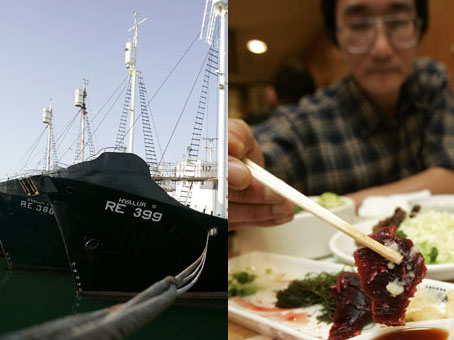Iceland undecided on commercial whale hunts
(Reuters)Updated: 2007-04-15 19:09
In October last year, Iceland broke a 1986 ban by giving whalers permission to catch 30 minke whales and nine larger and rarer fin whales. The step drew formal protests from two dozen anti-whaling nations from the United States to Australia.
Iceland's prime minister says his government has not decided if it will let the commercial hunts continue.
"In a sense, what happened last year was an experiment. We of course have not given away our right to catch whales in a sustainable way, that's part of our sovereign right," Prime Minister Geir Haarde told Reuters in an interview.
Haarde, facing elections on May 12, said the government must factor global criticism into its decision-making.
"It's an equation with several elements in there -- one is the market, one is world public opinion, one is tourism and so on -- and we have to weigh all these together, and the different interests, before we come up with a new decision," Haarde said.
"A lot will depend on whether or not there is a market for these products, and that is for the company involved to find out."
"The company involved" -- Iceland's largest whaling firm Hvalur, which caught all seven fin whales -- is playing a waiting game.
And that is where the 100 tonnes of whale meat comes in.
Kristjan Loftsson, Hvalur's managing director, is waiting for the results of a months-long analysis of the fin whale meat his firm put on ice last fall. Once that is complete, he says he will have no trouble selling to buyers lined up in Japan.
He is also waiting for new, and hopefully higher, quotas from the government since the 2006 take was too small to offset the cost of setting up operations mothballed since 1989.
While the fin whale is deemed endangered on a global basis, the government says it is plentiful around Iceland.
Good money
"It's good money," Loftsson said of whaling, declining to offer specifics. "If you can catch a proper amount of whales."
The 55-year-old steam-driven ship used in last year's hunts lies in Reykjavik harbour alongside three other Hvalur whaling vessels unused since 1989.
Hoping for new quotas, Loftsson's staff are readying it for June when there is enough daylight to spot blasts from whale blow holes. The interior smells sharp with new varnish.
Whaling is an old-fashioned affair for Hvalur's whalers. They pinpoint the blow from their target from the crow's nest and then shoot it with a 70-kg four-clawed harpoon tipped with a grenade that explodes inside the whale.
Loftsson said the explosion causes swift death.
The crew winches the dead whale up the ship's side and tows it to Hvalur's land-based rendering operation, pumping ice water through its veins in transit to delay spoilage.
The whale is then flensed, or denuded of fat and meat, and the meat is shifted to freezers, ready for analysis.
Loftsson said although he has buyers lined up, he has not signed any contracts and declined to name them or to say how much the meat would fetch.
A whaler's son who also has interests in fisheries, Loftsson said the analysis has taken much longer than expected.
"I didn't realise how laborious it is. They want PCBs, mercury and all sorts of analysis. You have to document the results and this is about close to 5,000 figures," he said.
"With all these food scares today, this is just (what) the (buyers) demand."
Haarde said he has "a hunch" that if Loftsson and the smaller whaling operations that catch minkes cannot sell their meat, they will lose the desire to whale. In that case, the government likely will not announce new quotas for 2007.
"Not on any commercial basis. We may continue with some scientific research. But it's too early to tell," he said.
"If (Loftsson) is able to sell that meat, then we will have to assess the situation in light of that."
While many Icelanders see no reason why whales should be treated differently from fish, some see the negative global reaction as cause for concern.
Baugur Group, owner of UK and Nordic retailers including House of Fraser, said in January that commercial whaling could prompt boycotts of Icelandic firms with foreign operations.
Scientist Ragnhildur Sigurdardottir worries that this is a bad time for Iceland to be on the wrong side of an increasingly vocal environmental movement.
"It's bad PR and there is no real reason for it," she said. "People are making more money out of whale watching."
|
||
|
||
|
|

